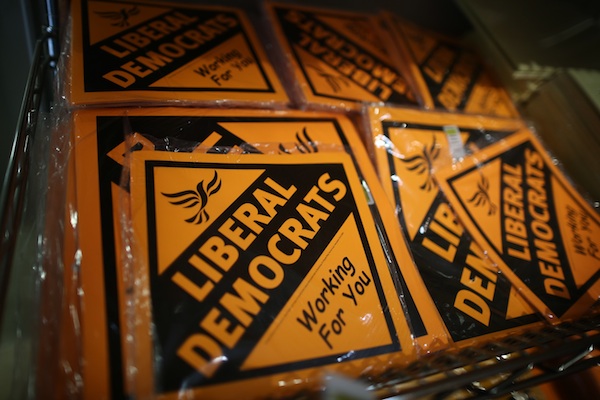Helena Morrissey has published her report on the allegations of sexism in the Liberal Democrats triggered by the Lord Rennard scandal. In short, she concludes that there wasn’t a cover-up, but her report suggests the party was guilty more of a cock-up. She told journalists this afternoon that ‘mistakes were definitely made by Nick Clegg, Danny Alexander and Jo Swinson’, and that ‘I think the party should have done things differently’. Here are the five main points from the 59-page report on ‘Processes and culture within the Liberal Democrats and Recommendations for Change’:
1. The party failed to address complaints properly, but did not consciously cover them up.
Morrissey’s report said:
‘My review has revealed a number of people within the Party failing to properly investigate complaints in a timely and professional manner. However, the reasons for this have been varied and I found little evidence to suggest a conscious attempt to ‘cover up’ problems. Instead, there has been a tendency for the Party to try to ‘handle’ complaints rather than to fully and properly investigate them in a timely, professional manner. Individuals appear to have been generally acting in good faith but without realising the importance of adhering to process or being aware of the processes in place. While this may appear a benign mistake, it has caused problems to fester unresolved, to the detriment of all involved.’
None of those at the top were judged guilty of a cover-up, rather Morrissey judged that they should have taken certain steps to address complaints that they failed to take. The report says ‘no-one really knew quite what to do in this sensitive situation’. Paul Burstow comes in for particular criticism as chief whip at the time, with the review judging that even though he believed the women involved did not want the matter taken further, he should have ‘proactively taken the issue to the president’. Swinson and Alexander acted in ‘good faith’, but their response to the allegations was ‘ultimately not sufficient’.
Morrissey said she only suspected a cover-up in one instance, but that further inquiries into the specific allegations confirmed that human resources had been involved.
2. The inquiries that did take place added to the confusion.
Questions still remain as to whether the women involved wanted a formal investigation. Morrissey suggested that complaints should have been written down, and that the staff listening to the complaints should not have promised confidentiality. The report says: ‘In this case, the ambiguity now over whether all the women did in fact want to remain anonymous would not exist if a proper and prompt investigation had been instigated.’ The party should have investigated the allegations regardless of the complainants’ desire to remain anonymous.
3. The Lib Dems are a complex party.
Anyone who doubted that just needs to look at this absurd organisational chart of the party.

Morrissey described it as ‘byzantine’, and said the ‘the organisational construct of the Liberal Democrats, as well as the sharing of power has made it difficult to impose and then monitor a common set of standards including around personal behaviour and conduct’. She doesn’t hold out much hope for that changing, suggesting it is ‘integral to the party’.
Morrissey also charted the growth of Lord Rennard’s ‘power base’, which grew under the ‘relatively relaxed management style’ of Charles Kennedy as party leader. One witness interviewed by the inquiry said:
‘Paddy got up at 6am in the morning and wanted to know how many pen nibs there were. Charles let a thousand flowers bloom. A gap opened up which Chris [Rennard] filled.’
And she observed that like other parties, the Lib Dems were like a ‘religious community, where the belief set overrides personal disappointments’.
She recommended that a Pastoral Care Office be set up in Party HQ as a contact point for all complaints that cannot be resolved through informal or local discussions. The office would have its own phone number for taking complaints, and provide employment and volunteer legal advice. It will act as an internal whistleblower.
4. The party did make mistakes in its media handling of the Rennard allegations when they broke.
Morrissey argued that the party should have offered a ‘proactive statement explaining what the Leadership had and had not been aware of and announcing proper, albeit belated investigations might not have defused the bomb but would have been better for the party than the damage limitation that followed’.
5. There was no suggestion that the behaviour continued after the 2008 allegations.
Morrissey told journalists at her briefing. But she also confirmed that the constituency of Mike Hancock, who has resigned the party whip while he fights a civil case, ‘was included in terms of that locale and behaviour there’.
Is this bad for the Lib Dems? Well, it could be worse. That there was no conscious cover-up is a relief for the party leadership. But the report is very clear that the party failed to meet expectations when it came to handling complaints, and that its organisation made this even more difficult.







Comments